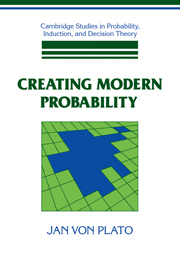Book contents
- Frontmatter
- Contents
- Preface
- 1 Introduction
- 2 Pathways to modern probability
- 3 Probability in statistical physics
- 4 Quantum mechanical probability and indeterminism
- 5 Classical embeddings of probability and chance
- 6 Von Mises' frequentist probabilities
- 7 Kolmogorov's measure theoretic probabilities
- 8 De Finetti's subjective probabilities
- Supplement: Nicole Oresme and the ergodicity of rotations
- Bibliography
- Index of Names
- Index of Subjects
8 - De Finetti's subjective probabilities
Published online by Cambridge University Press: 05 June 2012
- Frontmatter
- Contents
- Preface
- 1 Introduction
- 2 Pathways to modern probability
- 3 Probability in statistical physics
- 4 Quantum mechanical probability and indeterminism
- 5 Classical embeddings of probability and chance
- 6 Von Mises' frequentist probabilities
- 7 Kolmogorov's measure theoretic probabilities
- 8 De Finetti's subjective probabilities
- Supplement: Nicole Oresme and the ergodicity of rotations
- Bibliography
- Index of Names
- Index of Subjects
Summary
‘PROBABILITY DOES NOT EXIST’
The two main interpretive ideas about probability for the times under discussion are the frequentist and the subjectivist. Frequentist probability has had a remarkable role in the development of modern probability. It was the object of von Mises' theory, and it was more or less tacitly assumed as the interpretation of probability by the main proponents of mathematical probability in the 1920s. No attention was paid to the idea of subjective probabilities. The most one can find are Borel's philosophical essay (1924), which is a review of Keynes' Treatise on Probability of 1921, Borel's papers on game theory, and Lévy's discussion of subjective probability in his book of 1925. Borel's main contribution to probability (1909a), though, was from much earlier times.
The idea of subjective probabilities was further undermined by the developments in physics: Classical statistical physics already contained a commitment to statistical probability at least, and quantum mechanics brought a new kind of fundamental indeterminism into the description of nature's basic processes in 1926. An epistemic notion of probability must at that time have seemed like a thing from the past, from the shadows of the Laplacian doctrine of mechanical determinism.
In the 1920s philosophical thinking, or at least the part of it sensitive to scientific developments, was transformed through the rise of logical empiricism. Heisenberg's quantum mechanics of 1925 is one example of a scientific theory that shows the mutual effect of philosophical ideas and theory construction.
- Type
- Chapter
- Information
- Creating Modern ProbabilityIts Mathematics, Physics and Philosophy in Historical Perspective, pp. 238 - 278Publisher: Cambridge University PressPrint publication year: 1994
- 1
- Cited by



